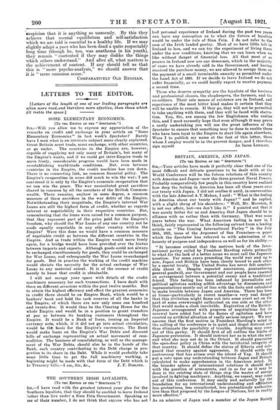LETTERS TO THE EDITOR.
[Letters of the length of one of our leading paragraphs are often more read,and therefore more effective, than those which fill treble the space.]
SOME ELEMENTARY ECONOMICS.
(To THE EDITOR OY THE " SPECTATOR.")
Sia,—Will you allow me to express my appreciation of the remarks on credit and exchange in your article on "Some Elementary Economics" in last week's Spectator? Rarely have I seen what is an intricate subject more clearly explained. Great Britain must trade, must exchange, with other countries, or go under. The countries in the Empire are, however, capable of supplying not only many of Britain's, but many of the Empire's wants, and if we could get inter-Empire trade to move freely, considerable progress would have been made in re-establishing world-trade conditions. But, even between countries in the Empire, the credit machine has run down. There is no connecting link, no common financial policy. The Empire's co-operation in arms did much to win the war; I am convinced it is only by the Empire's economic co-operation that we can win the peace. The war necessitated great sacrifices shared in common by all the members of the British Common- wealth. There remains, anyhow in some degree, a common measure of these sacrifices in the war debts of the Empire. Notwithstanding their magnitude, the Empire's internal War Loans are still the highest form of credit, whether as regards interest or negotiability in their respective countries. But, remembering that the loans were raised for a common purpose, that they represent part of the price paid for the Empire's freedom, why should the War Loans of any one country not be made equally negotiable in any other country within the Empire? Were this done we would have a common measure of negotiable credit as between the different countries in the Empire. And so trade within the Empire would move freely again, for a bridge would have been provided over the hiatus between imports and exports. Although goods could not always be exchanged simultaneously for goods, they could be exchanged fbr War Loans, and subsequently the War Loans re-exchanged for goods. But in practice the working of the credit machine would obviate the necessity for the actual exchange of War Loans to any material extent. It is of the essence of credit merely to know that credit is obtainable.
I will not occupy your space with details of the credit
machinery necessary for such transactions. I have dealt with these on different occasions within the past twelve months. But to attain the highest efficiency and effect the greatest economies in credit there should be an Empire Bank, which would be a bankers' bank and hold the cash reserves of all the banks in the Empire, of which there are now only some one hundred and twenty-five. It would thus be the Clearing House for the whole Empire and would be in a position to grant transfers at par, as between its banking customers throughout the Empire. It would be a Bank of Issue, issuing an Imperial currency note, which, if it did not go into actual circulation, would be the basis for the Empire's currencies. The Bank would make loans on the Empire's War Debts and discount bills of exchange representing an actual movement of com- modities. The business Of consolidating, as well as the manage-
ment of the War Debts, should also be in the hands of the Bank, each country contributing to the Debt charge in pro- portion to its share in the Debt. While it would probably take some little time to get the full machinery 'working, a beginning might be made with that form of the Debt which is
in Treasury bills.—I am, Sir, &c., J. F. DARLING.


































 Previous page
Previous page